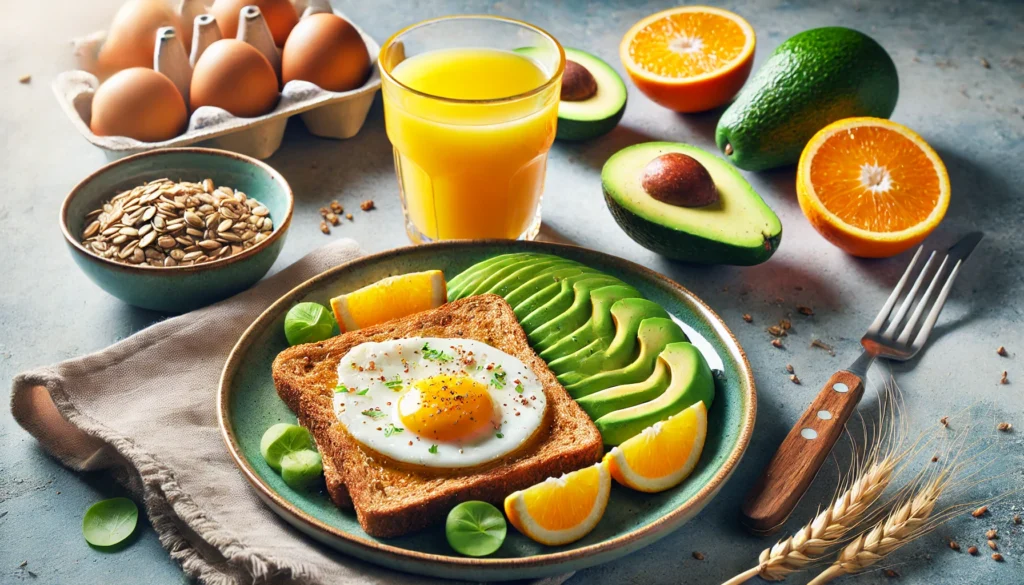In a world driven by information and knowledge, the ability to concentrate and absorb information efficiently is paramount. While many factors contribute to effective studying, nutrition plays a crucial yet often overlooked role. The food you consume can significantly impact your mental acuity, focus, and overall cognitive function. This article delves into the best foods for studying, offering insights into how you can enhance your learning capabilities through mindful eating.
You may also like: Memory-Boosting Foods You Should Try Today
The Science Behind Brain Food
Before we delve into specific foods, it’s essential to understand the science behind brain food. The brain, a high-energy organ, requires a constant supply of glucose, which is obtained from carbohydrates. However, not all carbohydrates are created equal. Complex carbohydrates found in whole grains provide a steady supply of energy, unlike simple carbohydrates, which can lead to spikes and crashes in blood sugar levels.
The Role of Carbohydrates
Complex carbohydrates are critical for sustained energy. Unlike their simpler counterparts, complex carbs break down slowly, offering a prolonged release of glucose into the bloodstream. This process ensures that the brain receives a continuous supply of energy, essential for maintaining focus and concentration during prolonged study sessions. Simple carbs, in contrast, can cause rapid spikes in blood sugar, leading to bursts of energy followed by crashes that affect mental clarity.
Omega-3 Fatty Acids and Brain Health
Omega-3 fatty acids are vital for maintaining the structure and function of brain cells. These essential fats, particularly DHA and EPA, are components of the cell membranes in the brain and play a significant role in neural development. Deficiencies in omega-3s have been linked to cognitive decline and mood disorders, emphasizing their importance in a study diet. Regular consumption of omega-3-rich foods can improve memory and overall cognitive function.
Antioxidants and Cognitive Function
Antioxidants combat oxidative stress, a process that can damage brain cells and impair cognitive function. Oxidative stress occurs when there’s an imbalance between free radicals and antioxidants in the body. Foods rich in antioxidants help neutralize free radicals, protecting the brain from damage and potentially delaying cognitive decline. Incorporating a variety of antioxidant-rich foods into your diet can support brain health and enhance learning capabilities.
Vitamins and Minerals Supporting Cognition
Vitamins and minerals are essential for numerous cognitive functions. B vitamins, for example, play a crucial role in energy production and the synthesis of neurotransmitters, which are vital for brain communication. Iron aids in oxygen transport to the brain, improving focus and energy. A diet lacking these essential nutrients can lead to decreased cognitive function, making their inclusion in your diet imperative for effective studying.
Best Foods for Studying
Fatty Fish
Fatty fish, including salmon, trout, and sardines, are rich sources of omega-3 fatty acids. These essential fats are crucial for brain health, as they help build brain and nerve cells. Studies suggest that a deficiency in omega-3 fatty acids can lead to learning impairments and depression. Incorporating fatty fish into your diet can improve memory, mood, and overall brain function.
Types of Fatty Fish and Their Benefits
Different types of fatty fish provide varying amounts of omega-3s. Salmon, for instance, is renowned for its high DHA content, crucial for brain development and function. Trout and sardines also offer significant amounts of these beneficial fats, contributing to improved cognitive performance. Regular consumption of these fish can lead to better memory retention and a reduced risk of mental decline.
Cooking Methods for Maximum Benefits
The way you prepare your fish can impact the nutritional benefits you receive. Grilling or baking fish preserves the omega-3 content better than frying, which can degrade these essential fats. Marinating fish with herbs and lemon can also enhance flavor without adding unhealthy fats, making it a delicious and nutritious option for those looking to boost brain health.
Addressing Dietary Restrictions
For those who are vegetarian or allergic to fish, omega-3 supplements derived from algae can be a suitable alternative. Algae-based supplements provide DHA and EPA, similar to what is found in fish oil, without the risk of allergens. This option ensures that individuals with dietary restrictions can still receive the cognitive benefits of omega-3s.
Blueberries
Often dubbed as a superfood, blueberries are loaded with antioxidants, specifically flavonoids. Research indicates that these compounds may delay brain aging and improve memory. A study published in the “Journal of Agricultural and Food Chemistry” found that blueberry supplementation improved memory in older adults. Including blueberries in your diet can be a delicious way to enhance cognitive function.
Antioxidants and Brain Aging
The flavonoids in blueberries play a significant role in combating oxidative stress, which is linked to brain aging. These compounds help protect the brain from age-related damage and have been shown to improve communication between brain cells. Regular consumption of blueberries can, therefore, aid in maintaining cognitive function as you age.
Incorporating Blueberries into Your Diet
Blueberries are versatile and can be easily included in various meals. Add them to your morning cereal or yogurt for a nutritious breakfast, or blend them into smoothies for a refreshing study snack. They can also be used in baking, offering a natural sweetness and a boost of antioxidants to muffins and breads.
Seasonal and Frozen Options
While fresh blueberries are typically available in the summer, frozen blueberries are a convenient and equally nutritious option year-round. Freezing preserves their antioxidant content, making them a reliable choice for those looking to enhance their diet with brain-boosting foods regardless of the season.
Dark Chocolate
Dark chocolate is not only a delectable treat but also a potent brain booster. It contains caffeine, flavonoids, and antioxidants, all of which contribute to improved brain function. Flavonoids, in particular, are known to enhance memory and learning by increasing blood flow to the brain. A moderate consumption of dark chocolate can boost mood and cognitive performance, making it a perfect snack during study sessions.
Caffeine and Alertness
The caffeine in dark chocolate can provide a mild energy boost, improving alertness and concentration. Unlike coffee, dark chocolate offers this benefit without the risk of jitteriness, as it contains a lower caffeine content. This makes it an excellent option for those who seek a gentle cognitive boost during study periods.

Choosing the Right Chocolate
Not all chocolates are created equal. To maximize health benefits, choose dark chocolate with at least 70% cocoa content. Higher cocoa percentages ensure a greater concentration of flavonoids and less sugar, optimizing the brain-boosting properties of your snack.
Mindful Consumption
While dark chocolate has numerous benefits, it’s important to consume it in moderation due to its calorie density. A small piece can suffice to provide cognitive benefits without overindulging. Pairing dark chocolate with nuts or berries can create a balanced, nutritious snack that supports brain health.
Nuts and Seeds
Nuts and seeds, such as walnuts, almonds, and flaxseeds, are excellent sources of antioxidants, healthy fats, and protein. Walnuts, in particular, are rich in alpha-linolenic acid (ALA), a type of omega-3 fatty acid that has been linked to better brain health. These nutrient-dense snacks can improve brain function and provide sustained energy, making them ideal for long study sessions.
The Specific Benefits of Different Nuts
Each type of nut offers unique benefits. Walnuts are particularly high in omega-3s, which support cognitive function. Almonds are rich in vitamin E, an antioxidant that protects brain cells from damage. Flaxseeds are an excellent source of fiber and ALA, promoting overall brain health. Incorporating a variety of nuts and seeds can provide a comprehensive range of nutrients to support cognitive function.
Incorporating Nuts and Seeds into Meals
Nuts and seeds can be easily added to meals for a nutritional boost. Sprinkle them over salads for added crunch, or incorporate them into baked goods for a healthy snack. They can also be blended into smoothies or used as a topping for oatmeal, providing sustained energy and brain support throughout the day.
Addressing Allergies and Alternatives
For individuals with nut allergies, seeds such as sunflower or chia seeds can be a suitable alternative. These seeds offer similar benefits, including healthy fats and antioxidants, without the risk of allergic reactions. Ensuring a diverse diet can help accommodate dietary restrictions while still reaping the cognitive benefits of these foods.
Whole Grains
Whole grains, including oats, brown rice, and quinoa, provide a steady supply of glucose to the brain. Unlike refined grains, whole grains have a low glycemic index, which means they release energy slowly, preventing blood sugar spikes. This sustained energy release is crucial for maintaining focus and concentration throughout the day.
The Glycemic Index and Energy Levels
Whole grains’ low glycemic index ensures a slow, steady release of glucose into the bloodstream. This sustained energy helps maintain mental clarity and focus, reducing the risk of fatigue and distraction during study sessions. In contrast, refined grains can cause rapid energy spikes and crashes, hindering cognitive performance.
Incorporating Whole Grains into Your Diet
Whole grains can be seamlessly integrated into your daily meals. Start your day with a hearty bowl of oatmeal, or opt for brown rice or quinoa as a side dish at lunch or dinner. Whole grain bread and pasta are also excellent alternatives to refined versions, offering additional fiber and nutrients to support brain health.
Gluten-Free Options
For those with gluten sensitivities, grains like quinoa and brown rice provide excellent alternatives. These grains are naturally gluten-free and offer the same benefits as traditional whole grains, ensuring that dietary restrictions don’t impede cognitive support.
Leafy Greens
Leafy greens, such as spinach, kale, and broccoli, are packed with essential nutrients, including vitamins K, C, and E. These vitamins are known to enhance brain health by supporting memory and cognitive functions. A study published in the “Annals of Neurology” found that people who consumed more leafy greens had a slower rate of cognitive decline. Incorporating a variety of greens into your diet can support brain health and enhance learning capabilities.
The Nutritional Power of Leafy Greens
Leafy greens are nutrient powerhouses, providing essential vitamins and minerals that support brain health. Vitamin K, found in abundance in greens, is crucial for cognitive function and memory retention. Vitamins C and E act as antioxidants, protecting brain cells from damage and supporting overall cognitive health.
Creative Ways to Enjoy Leafy Greens
Leafy greens can be enjoyed in various forms, making it easy to incorporate them into your diet. Add spinach to smoothies for a nutrient boost without altering the taste, or include kale in salads and stir-fries for added texture and flavor. Broccoli can be steamed or roasted as a side dish, offering a delicious and nutritious accompaniment to any meal.

Seasonal and Fresh Options
While fresh greens are often available, frozen versions can be a convenient alternative that retains most of the nutritional benefits. Buying in-season greens not only ensures freshness but can also be more cost-effective, encouraging regular consumption of these brain-boosting foods.
Eggs
Eggs are a rich source of several nutrients tied to brain health, including vitamins B6 and B12, folate, and choline. Choline, in particular, is crucial for the production of acetylcholine, a neurotransmitter that regulates mood and memory. Consuming eggs can improve cognitive performance and support overall brain health.
The Role of Choline in Brain Function
Choline is essential for the synthesis of acetylcholine, a neurotransmitter involved in memory and learning. Adequate choline intake supports the development of the brain and enhances cognitive performance. Eggs are one of the richest sources of choline, making them a valuable food for students and anyone looking to boost brain health.
Versatile Egg Preparations
Eggs can be prepared in numerous ways, making them a versatile addition to any meal. Enjoy them boiled for a quick snack, or scramble them with vegetables for a nutritious breakfast. Omelets and frittatas offer creative ways to incorporate other brain-boosting ingredients, such as leafy greens and cheese, for a balanced meal.
Addressing Cholesterol Concerns
While eggs are high in cholesterol, recent research suggests that dietary cholesterol has a minimal impact on blood cholesterol levels for most people. Consuming eggs in moderation can be part of a healthy diet without significantly affecting heart health, allowing you to enjoy their cognitive benefits.
Practical Tips for Incorporating Brain Foods
Balanced Meals
To maximize the benefits of brain foods, aim to incorporate a variety of these nutrients into your meals. A balanced meal may include a serving of fatty fish, a side of leafy greens, whole grains, and a handful of nuts or seeds.
Creating Balanced Meal Plans
Planning meals ahead can help ensure a balanced intake of brain foods. Consider preparing a weekly menu that includes a variety of nutrient-dense options, ensuring each meal provides a mix of proteins, healthy fats, and carbohydrates to support cognitive function.
Portion Control and Meal Frequency
Eating smaller, balanced meals throughout the day can maintain energy levels and enhance focus. Avoid large meals that may cause sluggishness, opting instead for regular, nutrient-rich snacks to keep your brain fueled and alert.
Incorporating Variety for Nutritional Balance
Diversity in your diet ensures a comprehensive intake of essential nutrients. Rotate different brain foods throughout the week to avoid monotony and ensure you receive the full spectrum of vitamins, minerals, and antioxidants needed for optimal brain health.
Healthy Snacking
Opt for brain-boosting snacks such as dark chocolate, blueberries, or a mix of nuts and seeds during study breaks. These snacks provide a quick energy boost and enhance cognitive function.
Preparing Nutritious Snacks
Having pre-prepared snacks on hand can prevent unhealthy eating habits during study sessions. Consider portioning out nuts and seeds into small containers or preparing a mix of dried fruits and dark chocolate to create convenient, healthy options.
Timing and Frequency of Snacks
Timing your snacks strategically can enhance cognitive performance. Opt for a small snack every few hours to maintain steady energy levels, especially during intense study periods. Avoid sugary snacks that can lead to energy crashes, choosing nutrient-dense alternatives instead.
DIY Snack Ideas
Get creative with homemade snacks that combine brain-boosting ingredients. Trail mixes with nuts, seeds, and dried fruits are easy to make and customize. Energy balls made from oats, nut butter, and dark chocolate can provide a delicious, portable snack option.
Hydration Matters
Staying hydrated is equally important for maintaining cognitive function. Dehydration can lead to fatigue and reduced concentration. Ensure you drink enough water throughout the day to stay alert and focused.
The Impact of Hydration on Cognition
Proper hydration is crucial for maintaining optimal brain function. Even mild dehydration can impair cognitive abilities, leading to difficulties in concentration and memory retention. Regular water intake is essential for sustaining mental clarity.
Hydration Strategies for Students
Developing a consistent hydration routine can enhance study performance. Keep a water bottle nearby during study sessions and set reminders to take regular sips. Infusing water with fruits or herbs can add flavor, encouraging increased water consumption.
Alternatives to Water
While water is the best choice for hydration, other beverages like herbal teas can provide additional benefits. Certain teas, such as green tea, contain antioxidants that support brain health, offering a flavorful alternative to plain water.
Future Implications and Trends
As we continue to explore the relationship between diet and cognitive function, emerging trends such as personalized nutrition and nootropics are gaining attention. Personalized nutrition tailors dietary recommendations based on individual genetic makeup, potentially optimizing brain function. Nootropics, often referred to as “smart drugs,” are substances that may enhance cognitive performance. While research is still ongoing, these trends highlight the growing interest in optimizing brain health through diet and supplements.
Personalized Nutrition and Genetic Insights
Personalized nutrition involves tailoring dietary recommendations to an individual’s genetic profile. This approach considers genetic variations that affect how the body metabolizes nutrients, allowing for customized dietary plans that can enhance cognitive performance. As research advances, personalized nutrition could become a mainstream strategy for optimizing brain health and studying efficiency.
Nootropics and Their Role in Cognitive Enhancement
Nootropics, or cognitive enhancers, are gaining popularity for their potential to boost brain function. These substances, ranging from natural supplements to pharmaceuticals, aim to improve focus, memory, and overall cognitive performance. While the efficacy and safety of nootropics are still under investigation, their growing popularity highlights a burgeoning interest in non-traditional methods of cognitive enhancement.
The Integration of Technology in Diet and Cognition
Technology is playing a pivotal role in understanding the diet-brain connection. Wearable devices and apps that track dietary intake and cognitive performance provide valuable data, helping individuals make informed decisions about their eating habits. This integration of technology and nutrition science offers exciting possibilities for enhancing brain health and academic performance.

Conclusion
In conclusion, the foods you consume can significantly impact your ability to study effectively. By incorporating brain-boosting foods such as fatty fish, blueberries, dark chocolate, and leafy greens into your diet, you can enhance cognitive function, improve memory, and maintain focus. As research continues to unveil the intricate connections between diet and brain health, staying informed and making mindful dietary choices can empower you to achieve your academic and personal goals.
Further Reading:
Foods linked to better brainpower
Brain Foods for Exams: 5 Best Foods to Eat Before a Test
Twin research indicates that a vegan diet improves cardiovascular health
Important Note: The information contained in this article is for general informational purposes only, and should not be construed as health or medical advice, nor is it intended to diagnose, prevent, treat, or cure any disease or health condition. Before embarking on any diet, fitness regimen, or program of nutritional supplementation, it is advisable to consult your healthcare professional in order to determine its safety and probable efficacy in terms of your individual state of health.
Regarding Nutritional Supplements Or Other Non-Prescription Health Products: If any nutritional supplements or other non-prescription health products are mentioned in the foregoing article, any claims or statements made about them have not been evaluated by the U.S. Food and Drug Administration, and such nutritional supplements or other health products are not intended to diagnose, treat, cure, or prevent any disease.


